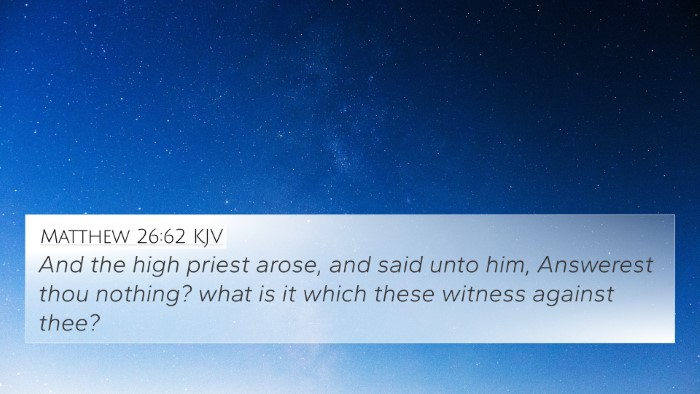Matthew 27:13 Interpretation
In Matthew 27:13, we find the moment when Jesus stands before Pilate, the Roman governor, as He faces accusations of claiming to be the King of the Jews. Pilate asks Jesus, “Art thou the King of the Jews?” to which Jesus responds affirmatively. This verse marks a significant point in the Passion narrative and sets the stage for the trial that ultimately leads to His crucifixion.
Contextual Significance
This passage is not merely a historical account; it is emblematic of the fulfillment of prophecy and the overarching narrative of redemption that permeates Scripture. The public domain commentaries offer profound insights into the theological implications of this dialogue:
- Matthew Henry explains that this moment illustrates the contrast between earthly authority and divine majesty. Jesus, despite His humble appearance, is affirming His kingship, suggesting that true authority lies not in political power but in spiritual sovereignty.
- Albert Barnes highlights that Pilate’s question and Jesus’s response exemplify the tension between the earthly realm and the divine purpose. Barnes notes that Jesus is aware of His mission and willingly confronts the injustice of the trial.
- Adam Clarke delves into the nuances of Pilate’s investigation, suggesting that this scrutiny reveals the governor’s inner conflict. Clarke posits that Pilate represents the moral ambiguity of humanity when faced with truth.
Theological Reflections
This verse invites readers to reflect on several overarching theological themes:
- Authority of Christ: Jesus’s claim is a cosmic declaration of His kingship which resonates throughout the New Testament, establishing Him as the Messiah (John 18:36).
- The Innocence of Jesus: The interrogation reveals Jesus’s innocence amidst false accusations (Isaiah 53:7), a theme echoing throughout the Scriptures.
- Fulfillment of Prophecy: Jesus’s position as King aligns with prophetic writings from the Old Testament (Zechariah 9:9), affirming the continuity in God's redemptive plan.
Cross-Referencing Biblical Texts
In exploring this verse, it’s vital to consider how it connects to other Scriptures. Here are some relevant Bible cross-references that enhance understanding:
- Isaiah 53:3 - This verse foreshadows the Messiah's rejection.
- Psalm 22:1-18 - A prophetic psalm that speaks to the suffering and mockery faced by the Messiah.
- John 18:36 - Jesus responds to Pilate regarding His kingship, affirming His realm is not of this world.
- Philippians 2:10-11 - Highlights the universal recognition of Christ's lordship.
- Luke 23:3 - Similar account of the questioning by Pilate revealing the consistency in Gospel narratives.
- John 1:49 - Nathanael's confession of Jesus as the King of Israel aligns with the identity presented before Pilate.
- Revelation 19:16 - Portrays Christ as King of Kings and Lord of Lords, reinforcing His ultimate authority.
Practical Applications
The themes generate numerous practical applications for readers today:
- Understanding the nature of true kingship and authority as exemplified by Christ can inspire believers to seek spiritual rather than worldly validation.
- Reflecting on personal accusations and unjust treatment can encourage individuals to find solace in Jesus’s example of perseverance and grace.
- Studying cross-references enriches one’s comprehension of Scripture, linking themes of redemption and authority across Biblical narratives.
Conclusion
Matthew 27:13 serves not only as a moment of confrontation but as a profound opportunity for understanding the intersection of power, prophecy, and purpose in God’s redemptive plan. Engaging with this verse through the lens of public domain commentaries allows for a deeper appreciation of its significance. Furthermore, utilizing tools for Bible cross-referencing can uncover a tapestry of connections that enhance one’s journey through the Scriptures, providing a comprehensive approach to study and reflection.





